
 |
||||
|---|---|---|---|---|
| Volume 42 Number 30, October 6, 2012 | ARCHIVE | HOME | JBCENTRE | SUBSCRIBE |
Weekly On Line Newspaper of the
Revolutionary Communist Party of Britain (Marxist-Leninist)
Website:
http://www.rcpbml.org.uk
E-mail:
office@rcpbml.org.uk
170, Wandsworth Road, London, SW8 2LA.
Phone: 020 7627 0599:
Workers'Weekly Internet Edition
Freely available online
Workers' Weekly E-mail Edition
Subscribe
by e-mail daily: Free / Donate
WW
Internet RSS Feed
![]()
The Line of March Monthly
Publication of RCPB(ML)Subscribe

Over the
recent period, there have been marches, demonstrations and campaigns against
the cut-backs to health services at district general hospitals in Brighton,
North West London, Trafford and Hull, and elsewhere. This shows that the battle
is on for the future direction of the NHS.
In Trafford, which borders Manchester, local people are fighting a campaign against the closure of the accident and emergency unit. In Hull, 500 health workers and local people marched through the city centre to oppose the savage cuts to Hull and East Yorkshire Hospital Trust which faces £99 million cuts to its budget by 2017 and £24 million this year. The plans include cutting 300 acute beds and closing the specialist neurology ward at Hull Royal Infirmary. The quarterly report published by the Kings Fund which surveys the financial directors of Hospital Trusts and PCT Commissioners revealed that 40% of them expected patient care to worsen over the next few years because of the so-called “efficiency savings” of a 5% cut in the budgets of all NHS organisations year on year. This before the government target to cut £20 billion from the NHS budget by 2015. In addition, the report recorded that since March 2010 there has been a reduction of 29,223 full-time posts in the NHS with preliminary figures of 5.500 fewer nurses in the same period.
All of this shows that the future
direction of the NHS cannot be in implementing year-by-year enforced
“cost savings” and a refusal to budget hospitals to meet their
needs. The future direction of the NHS also cannot revolve around the
“productivity” and “efficiency” of the provision of
health care in this false market the government has created where financial
directors and boards have to “ 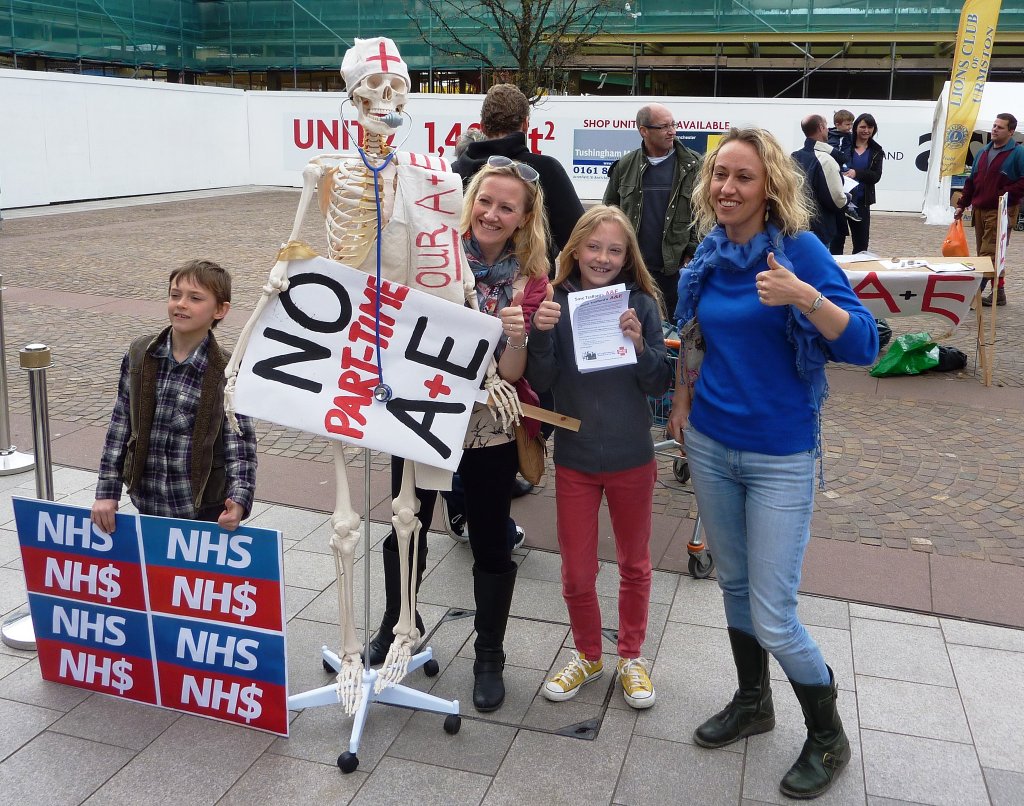
Campaign to save A&E at Trafford
Generalbalance their books”, or be declared
bankrupt and be taken over by the government's “Monitor” and have
cuts forced on them. The commissioner/provider split, far from creating
stability and growth of good health services, has created budget mechanisms
that have no coherence, that are designed to create the maximum amount of
fragmentation and disruption to health services. Also, the funding of NHS Trust
providers using the mechanism of “payment by results” and reduced
payments for certain readmissions has created fluctuating budgets in real time,
making it almost impossible to forward plan health care services. At the same
time, material and human resources are wasted on replacing services over and
over again using short-term contracts, by endlessly transferring staff and
reorganising services, redeploying and making staff redundant. This is driving
a rapid reduced redistribution of services where many core and specialist
services and skills are disappearing from local general hospitals which will
reduce access to a bare minimum for the majority of people. This all to open up
the opportunities for private health insurance and private health care at the
expense of the right of all to health care.
This whole direction for the way the NHS is being run must be changed. The government is championing the discredited interests of the financial oligarchy who stand to gain huge profits from the wrecking of the NHS and are already doing so. They must be held responsible for forcing through these programmes of privatisation and for the chronic deliberate underfunding of the NHS and its consequences.
The battle is on for the future of the NHS, and the working class and people must further develop their resistance and organisation to affirm that health care is a right and to decide the future of the NHS.
ShareThis

The UK Border
Agency (UKBA) has revoked London Metropolitan University’s status of
Highly Trusted Sponsor of international students, effectively ending its
license to teach such students. The UKBA has alleged that students cannot speak
English and are working instead of studying. Some 2,600 students were initially
faced with the prospect of deportation after sixty days’ notice if they
could not find a course at another university.
After the intervention of the National Union of Students (NUS) in the legal process, representing the students’ interests, the High Court granted permission for the university to apply for a full judicial review over the UKBA’s decision.
As a result, the threatened students will be allowed to continue to study until whichever is the sooner of the end of the current academic year (finishing next summer) or the completion of their courses.
Eddie Rowley, Unison steward, was quoted as saying, “If there are problems with individual students, visas and so forth, then those problems should be tackled. The UKBA should work in partnership with the London Met to sort out these. But banning all international students – those with excellent English, those who have no visa problems – is a complete overreaction.” It is clear that there is to be no such partnership, and that there are other motives at work.
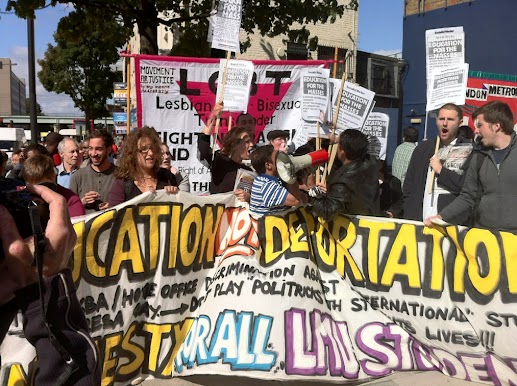
Eddie Rowley
went on to say that the authorities had “spent the last five or six
months making overtures to the private sector in their bid to privatise the
university. They want to outsource the whole support services and what they
call shared services and they’ve been setting up a partnership with the
London School of Business and Finance...”
Max Watson, Chair, Unison London Met branch, emphasised: “In the last six months we’ve had a campaign. The slogan has been ‘Education, Not Privatisation!’ In the last two months, we’ve told management, if they continue with their privatisation agenda, we will trigger an industrial action ballot for strike action to defeat their plans for privatisation. Our new slogan today is ‘Education, not Deportation!’ This is our number one priority.”
NUS president Liam Burns said, “As this is the first time that the government has revoked the sponsor status of a public institution, we are in uncharted territory, and this case will set important precedents for the future treatment of both domestic and international students.”
The damage to the university remains, and many students still face deportation at a later date. The injunction represents only a temporary reprieve until the outcome of the Judicial Review itself – which is expected to take at least several months to be heard. Meanwhile, the university’s license to recruit international students is still suspended, and its current international students are still in limbo, particularly if they have more than this academic year to complete, and courses and jobs are still threatened. The fight remains for the very survival of London Met as a public university. The essence of the precedent being sought by the government and authorities is that they can simply impose such autocratic, executive decisions.
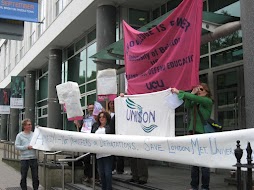
People have
been expressing their anger at the sheer unreasonableness of the brazenly
arbitrary decision, which is a kind of “collective punishment”
against the university. Hundreds of students and staff protested outside of the
Home Office on September 5 to demand “Hands off London Met!” and
“Education Not Deportation!” A London-wide march for justice took
place on September 28 under the banner, “Amnesty Now – Save London
Met – No to Privatisation”. The initiative was supported by London
Region UCU, and University of London Union (ULU). The Emergency Motion passed
in September by the TUC Congress can be viewed [here].
If the aim of this collective punishment is to break the resistance and weaken the opposition to the privatisation agenda, making an example of the students and staff of the university, this should be of serious concern to all.
This arbitrary act is an attack on the students directly affected and an attack on the rights of all. The treatment of these students is a matter of humanity, not of their “legitimacy” or “economic contribution”; the inhumanity of the sweeping threat of deportation and throwing into such uncertainty about the future of these young people is an affront to their rights as human beings. The arbitrariness of the decision is itself an attack on all.
Justice for the London
Met Students!
Save London Met University!
Education Not Privatisation!
ShareThis

Aleida Guevara speaking outside the US
Embassy Aleida Guevara is the eldest daughter of
revolutionary leader Ernesto “Ché” Guevara and Aleida March.
She undertook a speaking tour of Britain from September 9-19 to mark the 14th
anniversary of the unjust imprisonment of the Cuban Five which fell on
September 12. The tour was held under the auspices of the Cuba Solidarity
Campaign. Aleida Guevara is a paediatrician, a doctor of medicine, and has also
worked as a physician in Angola, Ecuador and Nicaragua. She speaks in
passionate defence of Cuba and its right to self-determination, and is author
of the book “Chávez, Venezuela and the New Latin America”.
She was accompanied on the speaking tour by Luis Marron, former Political
Counsellor at the Cuban Embassy in London, who the friends of Cuba in this
country remember very warmly, and who acted as interpreter.
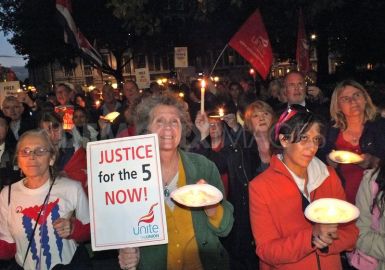
Candlelight vigil demands the release of Cuban
five On September 18, a Candelelit Vigil to demand the
release of the Cuban Five was held at the US Embassy, at which Dr Guevara was
the special guest and at which she spoke.
At the meetings on her tour, Dr Guevara signed copies of the newly-published book “Remembering Ché”, written by her mother, inscribing them with inspiring personal messages. She spoke in Brighton when the TUC Congress was taking place, then went on to Nottingham, Newcastle, Edinburgh and Glasgow, before addressing a public meeting in the House of Commons the day before the vigil for the Cuban Five. She rounded off her tour in Oxford, before going to Ireland to speak. The tour was supported by: Ken Gill Memorial Trust and London Region Unison.
At the House of Commons meeting, chaired by Baroness Angela Smith, over 150 people crammed into the committee room to hear Aleida speak about her father, the ongoing blockade of Cuba and the Cuban Five’s continuing struggle for justice. A transcript of her remarks is given below.

Baroness Smith,
Chair of the All Party Parliamentary Group (APPG) on Cuba and Vice-Chair of the
Cuba Solidarity Campaign, thanked Aleida for her attendance and called on the
solidarity movement in Britain to increase its efforts in support of the Cuban
Five and in opposition to the blockade.
Two MPs spoke alongside Aleida as they welcomed her to parliament. Michael Connarty praised the Cuban people and their commitment to social justice in the face of imperialist intervention. He has tabled Early Day Motion 497 which calls for visitation rights to be granted to Adriana Perez and Olga Salanueva to see their husbands, Gerardo Hernandez and Rene Gonzalez. He urged constituents to write to their MPs asking them to sign EDM 497 but also said, “write to the Prime Minister, write to William Hague, write to Obama, write to the European Commission on Human Rights, write to anyone supposedly interested in human rights. Never give up. Keep fighting, and I will fight with you!”
Cathy Jamieson MP spoke about how she had helped to re-establish the APPG on Cuba. She emphasised that there is a “committed group of politicians in the Commons and the Lords who will continue to raise concerns around the blockade and the Miami Five”.
ShareThis
(Translated by Luis Marron, transcribed by WWIE)
Good evening everyone.
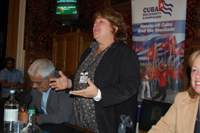
Aleida Guevara speaking
at House of CommonsAs you have already noticed, I don't
speak English. And I always have to start my presentations by apologising,
because when I was born the chip for languages was not provided!
(laughter) I lived for two years in Angola. I can read Portuguese, I can
understand Portuguese, but I cannot say a single word in Portuguese because I
would be destroying the language! So I simply gave up and although Luis is not
an interpreter he helps me in this respect.
For us it is beautiful to speak about Cuba. It is to speak about the country where we were born, to speak about the country where we have become better human beings. The Cuban people are going through very many problems. There are many economic problems, of course, and these economic problems also bring about social problems. But if you compare what is going on in Cuba with other countries in the world at the present time, we live in a very strong, stable society which gives a lot of hope for its people.
One of the most important problems we have faced throughout all these years of revolution has been the US blockade of Cuba. And I always like to describe the kind of life you live under a blockade. It might be easy to talk about the blockade, but to live in a country under a blockade is quite difficult. Especially when the laws of the blockade affect all medicine and food supplies. I will give you a few, simple, very quick and easy to understand examples. I have been visiting some cities in the UK, in England and Scotland. I saw beautiful cows. We don't have those cows in Cuba. I don't know if it has anything to do with the weather in Cuba. Maybe it is the excessive heat in the country, but in spite of all the breeding, and cross breeding we have had in Cuba, related to cattle, we have never managed to produce enough milk. The United States of America is one of the largest producers of powdered milk in the world. We are only ninety miles away from the US. The most natural thing, the most logical thing, would be if we could trade with them. I understand the right, as a country, not to trade with us if they don't want to. That has to be respected. What is unacceptable is that the United States tries to prevent other countries in the world from trading with us. And this has forced Cuba to go all the way to New Zealand to purchase powdered milk for the children and old people. You can imagine how expensive it will be for Cuba to go all the way to New Zealand to purchase powdered milk. On top of that, in order to be able to go all the way to New Zealand we have to charter a ship. Now the Acts of the blockade, the law that established the blockade, says that any ship that goes to Cuba will be prevented from coming into American ports for six months. So ship owners know that, and they will charge us three times more money than they would normally charge. So you can imagine how expensive it becomes to Cuba to purchase these food staples which are basic for the people.

Aleida Guevara and Luis Marron
speaking at Civic Centre, Newcastle I work as a
paediatrician. And things become difficult at times. We had a case of a child
with a specific kind of meningitis (Luis: which I am not capable of
translating into English). There is a specific medication to treat this
strain of meningitis. But this medication is produced by a subsidiary of a US
pharmaceutical. We have the money to purchase this medication but no one would
sell it to us. If the FBI detects, or finds out, that any firm is selling this
medication to us, the US administration can take action against the firm and
fine them between $5 to $10 million. They could simply withdraw whatever
capital they have in this firm, or they could prevent this firm from selling
their products in the United States. So it is impossible for this firm to trade
with Cuba, or to sell medications to Cuba. So a five-year-old kid would be
condemned to die because nobody will sell the medication they need. You should
notice that we are not asking them to donate it, or give it away for free. We
are simply demanding the right we have to purchase the medication. That is what
the blockade means for the Cuban people and that is what we have to face on a
day-to-day basis.
Now since the blockade was not enough for them to destroy the unity of the Cuban people, to destroy the revolutionary process in Cuba, from the very beginning the United States administrations have also tried to destroy the revolution using all sorts of aggression, be it military, be it biological warfare. And citizens of Cuban origin that live in the south of Florida have been used by the US government for these purposes. I am going to give you a handful of examples. I will ask you some questions and you tell me whether you agree or not. You will tell me whether you agree whether we are talking or we are not talking about terrorist actions.
If somebody poisons the water reservoir of a nursery is that or is it not a terrorist action? (Audience replies: Yes, Yes it is.)
If an artificially created disease is introduced to kill an animal population in the country, in this case pork which is a basic staple in Cuba's diet, is that or is it not a terrorist action? (Audience replies: Yes, Yes it is.)
If they put an exploded bomb on board a civilian aircraft, if fast boats come in the early hours of the morning and the people from these boats shoot at the civilian population living there, that is a terrorist action and these are the kind of actions that we have to prevent.
How can we put and end to this? Does anyone think that Cuba has an army strong enough to attack the United States? (Audience replies: No!)
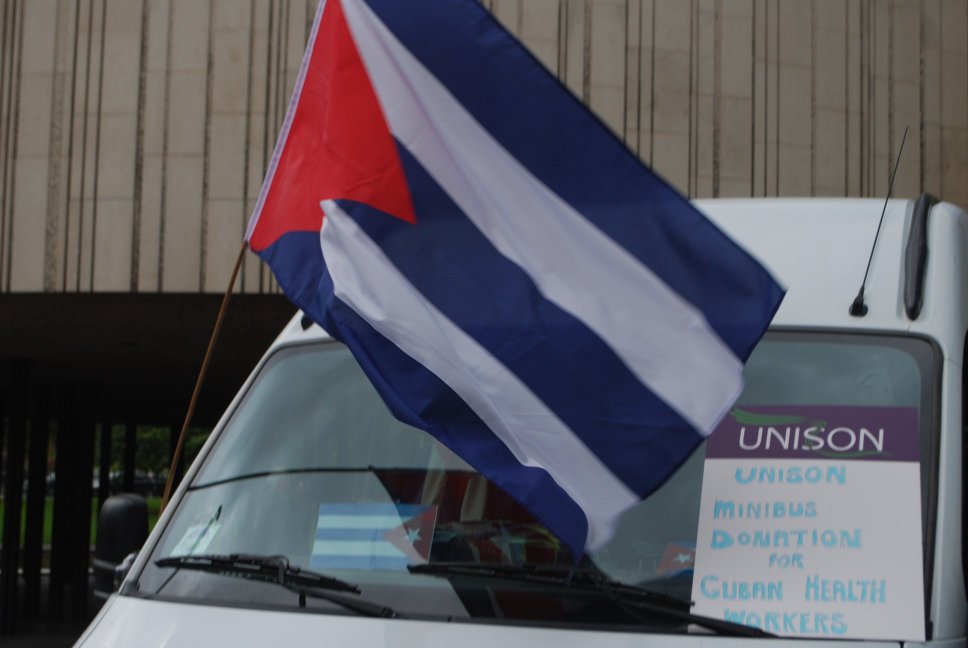
Unison Northern Region presents minibus
for Cuba to Aleida GuevaraSo what can we do? How can we
put an end to this activity? The only way we have is to have information. If
you have adequate information, you can work on preventing these terrorist
attacks. And that is why these five comrades are in prison in the United
States. Are they the first Cubans to do this? No. Are they the last Cubans to
do this? We would hope so, but it is not possible, because we will continue to
have the same problems and we have to protect our people.
Due to very special circumstances, the FBI detected these five men. Cuba is an island in the Caribbean and it lies in a very particular geographical position right in the middle of the traffic of drugs from Colombia, and other Latin American countries, to the United States. We had information to stop this drug trafficking in the area of the Caribbean. And we had information precisely because many of these Cuban Americans living in Florida have become very wealthy as a result of drug trafficking. We handed over this information to the FBI so that they could act and put an end to it. You should notice the levels of hypocrisy of the US government. The real terrorists, the drug traffickers, are free in the United States. These five men are in hell because they represent the best of the Cuban people. (Applause) This is something which actually violates the laws of the United States. In the trial of these five comrades, five ex-members of the US intelligence services said in that trial that none of the five Cubans had any information whatsoever that would be a threat to the national security of the United States. They didn’t care; the judge still convicted them and sentenced them to very outrageous terms in prison. As a law in the United States, no trial should take place in any place where there is no impartiality, where there is bias. This trial took place in the city of Miami, which is exactly the place where these terrorist organisations that they were fighting against are based. So what kind of justice can they expect? We now have information about the fact that the media in Miami were financed; many journalists were financed before and during the trial to spread disinformation against these five comrades. Why should five men be condemned? What is the reason behind this and why are they violating their own laws and condemning these five men? The only answer we can give to this is that the government of the United States is seriously ill – it is arrogance probably. If we don't go on fighting to have justice prevail in the case of these five men, we would once again be doing what Michael¹ was referring to before. If we turn a blind eye to these facts this is what makes injustice prevail. That is why for the Cuban people it is so important and so beautiful to see so much solidarity from all of you, from people like you in this struggle. (Applause)
Cuba is not perfect. We are aware of that. No society created by a human being can ever be perfect. We make mistakes, we commit errors every day, but we defend the right we have that it is only us that can work on rectifying those errors. No one of us, no Cuban, will ever go anywhere else in the world to tell anybody what they have to do. We will never do that because we have learned to respect other human beings. We might not understand some things. For example, I have never, ever understood the process to elect a king (laughter – applause) I swear I have never understood it! So, that is the reason that I can understand that there are other people that don't understand how we live in Cuba because it is a completely different reality. Our times, our cultures, are different. But the most important thing about this is that we should all be capable of learning from our differences. And I am sure if we have that chance it will also give us the possibility of joining forces. There are many things to be solved in Cuba, but Cuba also has many things to give. We have undoubtedly shown that there is another way in which you can live. We are not going to give any kind of special recipe to anybody, but if we could do it why can't you?
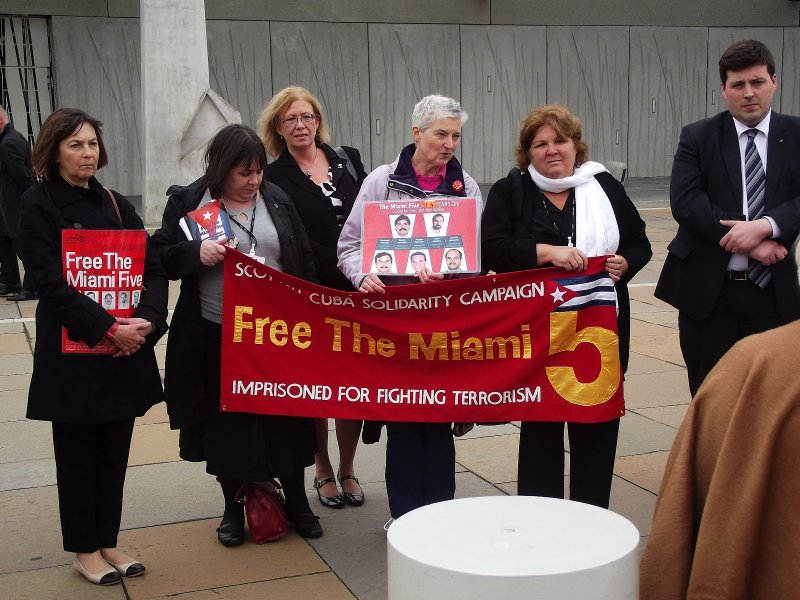
Aleida Guevara on speaking tour in
Scotland There are simply situations we can take
advantage of and there are many things we can do together. There are many
things we need to do together, but we need more respect among people, we need
to know each other more and we need to unite ourselves in common goals.
César Vallejo² the poet he once wrote and
mentions a dying body. One, two, or three men come close and approach this
dying body but the body continues dying. More people come to look at the body,
but the body continues to die. But when all of humanity came close to the body,
the body stood up to walk. That is the kind of strength we need, the unity of
all of us. Cuba has proved that when a people decides and rules over its own
destiny, unites and gets all its strength together, there is no power on earth
that can stop it. (Applause) But it all starts with solidarity.
Some people have said – I cannot say whether it is true – that Ché Guevara said that solidarity is the best expression of the tenderness of the people. I don’t know whether Ché Guevara actually said it but I think that is true. Men and women's tenderness makes solidarity possible. When a person is capable of admiring another person it is because that person carries the same values of the other person. That is why it is so great to see this solidarity, to feel and to touch it and as a Cuban woman, as a Cuban doctor and as a Cuban mother, I have to say simply, thank you very much. Thank you for your resistance. Thank you for your solidarity, and let us all struggle together for a better world. Hasta Victoria Siempre! (ovation)
¹ Michael Connarty MP who in his contribution said that the continuing denial of visitation rights represents a breach of human rights – rights which America “claim they are founded on”. He urged constituents to write to their MPs asking them to sign EDM 497 but also said, “Write to the Prime Minister, write to William Hague, write to Obama, write to the European Commission on Human Rights, write to anyone supposedly interested in human rights. Never give up. Keep fighting, and I will fight with you.”
² Vallejo’s poem, “Masa (Masses),” In this piece, describing the remains of a battle scene; throughout the scene, a man lays dead on the battlefield, and despite each time someone trying to do something to help the man, he remains unmoved: “Pero el cadáver, ¡ay! siguió muriendo / Oh! But the dead body continues dying.” This dire situation only resolves itself at the end of the poem, when everyone in the world joins in helping the dead man, and through this, the dead man rises: “abrazó al primer hombre; echóse a andar / he embraced the first man; he rose to walk.”
ShareThis
Big powers intent on invading and waging war on a sovereign country or countries, in order to gain hegemony over a region of the world, must first create public opinion for so doing, including denigrating and demonising a whole people. Such was the role played by the writer Salman Rushdie with his book The Satanic Verses published in 1988, which insulted Islam and gravely disturbed and provoked its followers. What followed is justified and grotesquely glamorised in Rushdie's latest book, Joseph Anton, an autobiographical work focussing on his decade under police protection, the title being his assumed name during that period. This new book is currently being massively promoted.
In the late ’80s, with the Soviet Empire collapsing, the main threat to Anglo-American imperialism's drive to dominate the world, apart from the remaining overtly socialist countries, was the anti-imperialist stance of various Middle East and Asian countries, albeit under the banner of Islam, but anti-imperialist in essence nonetheless. Contributing to the preparation of public opinion for military aggression against these countries a decade or more later was the work of certain intellectuals, notably Salman Rushdie.
The dreadful catastrophes subsequently to befall Afghanistan, Iraq and Libya, in particular, were to be the dire outcome.
Rushdie's insult to Islam and its believers could not have been but deliberate. He well knew what would be the result. The furore caused by his book could have been predicted. In fact, when riots broke out across South Asia, in which many died, Rushdie was quoted as expressing satisfaction that sales of his book might now increase.
Concerning his subsequent circumstances, it could well be asked if any other writer claiming to be "progressive" had ever been given round-the-clock protection by the Special Branch, at a level only previously accorded to a monarch or prime minister? Certainly, those in the progressive movement could readily list hundreds who have been harassed, persecuted, and even possibly eliminated by that very undercover state agency! Clearly the state was protecting a person who was doing it valuable service! In fact, rather than being the victim of cruel persecution, Rushdie, on his own admission, could be said to have lived the life of Riley during this period. In a recent interview, he gleefully recalls how the presence of "his boys" – in his own nauseating words "handsome, fit, armed and very sexy" – added a certain much-welcomed "cachet" to his appearance at numerous literary dinner parties. And his main eventual abode in London was in what was known locally as Millionaires Row.
At the time, publication of Rushdie's book, with its quite obscene passages, was defended on the grounds of Freedom of Speech, including by many in the communist and progressive movement. But surely, it cannot be so justified? The right of freedom of expression cannot cover the insulting of a whole people and their religion, in such a provocative way as to cause death and mayhem. Such an argument has time and time again been exposed as false, as in the debates in the ’60s and ’70s over No Platform for Racists and Fascists in the universities, when every student union in the land rightly supported the call.
Rushdie's latest book again serves imperialist warmongering. Its unrepentant defence and justification of his earlier insult and provocation to Islam and its followers, coming as it does when the drums of war beat once again over Syria and Iran – with the devastation of Afghanistan, Iraq and Libya plain for all to see – make clear why his book is receiving such massive publicity.
His latest book is to be condemned as strongly as his earlier work, as is its promotion!
ShareThis